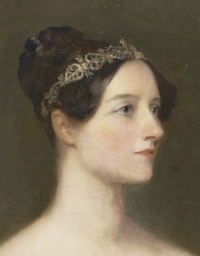 US Senator Ron Wyden has introduced a resolution honouring Ada Lovelace and recognising Ada Lovelace Day to the Senate, the upper chamber of the United States Congress. The senator, who represents Oregon, submitted S.Res.592 – A resolution designating October 9, 2018, as “National Ada Lovelace Day” and honoring the life and legacy of Ada Lovelace, the first computer programmer.
US Senator Ron Wyden has introduced a resolution honouring Ada Lovelace and recognising Ada Lovelace Day to the Senate, the upper chamber of the United States Congress. The senator, who represents Oregon, submitted S.Res.592 – A resolution designating October 9, 2018, as “National Ada Lovelace Day” and honoring the life and legacy of Ada Lovelace, the first computer programmer.
The statement is a Simple Resolution, which is “used to express nonbinding positions of the Senate”. These resolutions often “express public gratitude for distinguished contributions; dramatize the virtues of individuals, groups, and causes; and perpetuate the remembrance of significant events” says a congressional report. “During the past two centuries, commemoratives have become an integral part of the American political tradition,” the report says.
We are delighted that Ada Lovelace’s achievements have been recognised in this way, and that the Senate chose to support our mission of raising the profile of women in STEM by giving Ada Lovelace Day itself official status in the US.
The full text of the resolution (PDF) reads:
115TH CONGRESS
2D SESSION
S. RES.Designating October 9, 2018, as ‘‘National Ada Lovelace Day’’ and honoring the life and legacy of Ada Lovelace, the first computer programmer.
IN THE SENATE OF THE UNITED STATES
Mr. WYDEN (for himself and Mrs. FISCHER) submitted the following resolution; which was referred to the Committee on [25 July 2018]
RESOLUTION
Designating October 9, 2018, as ‘‘National Ada Lovelace Day’’ and honoring the life and legacy of Ada Lovelace, the first computer programmer.
Whereas Augusta Ada King-Noel, Countess of Lovelace, now known as Ada Lovelace, was born on December 10, 1815, in London, United Kingdom;
Whereas, from a young age, Lovelace displayed a gift for mathematics, languages, and the sciences;
Whereas, at the age of 17, Lovelace began to study mathematics under the guidance of scientist and translator Mary Somerville and, later, logician Augustus de Morgan;
Whereas, in 1833, Lovelace was introduced to inventor and mechanical engineer, Charles Babbage, and began to study his designs for the Analytical Engine, a mechanical computer;
Whereas Lovelace was the first person to recognize that the Analytical Engine could be used to manipulate symbols and letters and was the first person to theorize that the Analytical Engine could be used to create music and graphics;
Whereas, in 1843, Lovelace published step-by-step instructions for using the Analytical Engine to calculate Bernoulli numbers ‘‘without having been worked out by human head and hands first’’;
Whereas these insights gave Lovelace an unparalleled vision of the future of computer science, and she stated that ‘‘[a] new, a vast and a powerful language is [being] developed for the future use of analysis, in which to wield its truths so that these may become of more speedy and accurate practical application for the purposes of mankind’’;
Whereas the work of Lovelace went widely unrecognized until the 1950s, when her papers were republished, and their significance and her contributions to the fields of computer science and mathematics were finally acknowledged;
Whereas, in the 1980s, to honor the contributions of Lovelace, the Department of Defense named its newly created computer language ‘‘Ada’’ after Lovelace;
Whereas the second Tuesday in October is annually celebrated as Ada Lovelace Day and is intended to honor women in science, technology, engineering, and mathematics and their accomplishments and contributions to academia and the world; and
Whereas Ada Lovelace died on November 27, 1852, leaving behind a legacy of poetic science and reasoning, in which the arts and sciences are woven together to find new insights:
Now, therefore, be it
1 Resolved, That the Senate—
2 (1) designates October 9, 2018, as ‘‘National
3 Ada Lovelace Day’’; and
4 (2) honors the life and contributions of Ada
5 Lovelace, a leading woman in science and mathematics and the first computer programmer.
Senator Wyden tweeted:
Yesterday, the Senate passed two resolutions I introduced with @SenatorFischer honoring the lives of Grace Hopper and Ada Lovelace, two pioneers who paved the way for the information age. https://t.co/7kOsr1gtSB
— Ron Wyden (@RonWyden) July 26, 2018
And the British Embassy in Washington tweeted:
This week, the U.S. passed a resolution for a “National Ada Lovelace Day”. Keep reading to find out more about the life and work of the British woman who became the world’s first computer programmer. pic.twitter.com/TyR9FmAKHk
— British Embassy Washington (@UKinUSA) July 27, 2018
Born in 1815, when she was only 12 years old, Ada Lovelace conceptualized a flying machine that she described as “a thing in the form of a horse with a steam engine in the inside so contrived as to move an immense pair of wings.” pic.twitter.com/7iWu0bNNM0
— British Embassy Washington (@UKinUSA) July 27, 2018
At 17, Lovelace began to work with inventor & mathematician Charles Babbage, the “father of computers”.
Ada wrote the first algorithm designed to be carried out by a machine and was the first person to see the capability of computers as something more than a calculator. pic.twitter.com/Kc1DuUlAJN
— British Embassy Washington (@UKinUSA) July 27, 2018
Lovelace left an incredible legacy as both an ingenious analytical thinker & a pioneer of computer science innovation. She has been honoured with numerous awards bearing her name, a programming language named after her & now an 🇺🇸 day of honor. Ada Lovelace’s legacy lives on. pic.twitter.com/aQI4jjLA8q
— British Embassy Washington (@UKinUSA) July 27, 2018
A special thanks to Senator @RonWyden for sponsoring S.Res.592, a resolution designating October 9, 2018 as “National Ada Lovelace Day”.
Read the resolution here: https://t.co/3mg6nwdS0n pic.twitter.com/1Zt2mfb9Ni
— British Embassy Washington (@UKinUSA) July 27, 2018